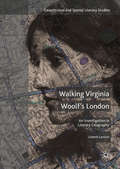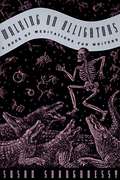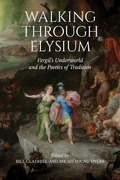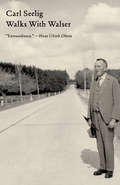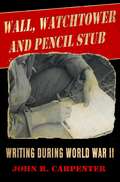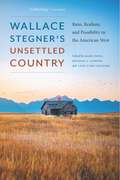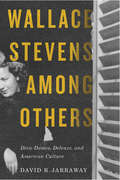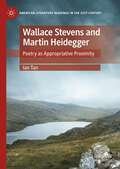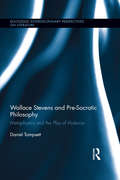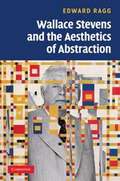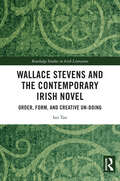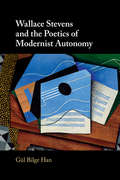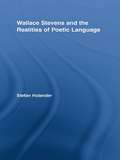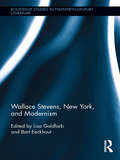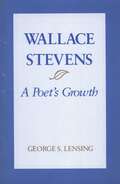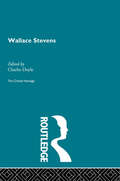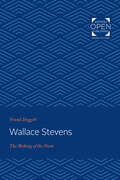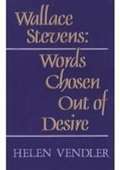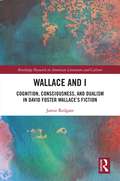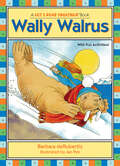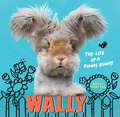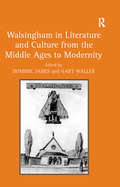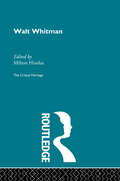- Table View
- List View
Walking Virginia Woolf’s London
by Lisbeth LarssonThis innovative volume employs theoretical tools from the field of literary geography to explore Virginia Woolf's writing and the ways in which she constructs her human subjects. It follows the routes of characters from The Voyage, Jacob's Room, Mrs. Dalloway, To the Lighthouse and more as they walk around London, demonstrating how Woolf constructs the characters in her stories in a very politically conscious way. As Larsson argues, none of Woolf's characters are able to walk just anywhere, at any time in history, or at any time of the day. Time, place, gender, and class form the conditions of life that the characters must accept or challenge. Featuring an array of detailed maps, Walking Virginia Woolf's London: An Investigation in Literary Geography brings a fascinating new perspective to Virginia Woolf's work. It is essential reading for scholars of modernist literature or geocriticism.
Walking in Roman Culture
by Timothy M. O'SullivanWalking served as an occasion for the display of power and status in ancient Rome, where great men paraded with their entourages through city streets and elite villa owners strolled with friends in private colonnades and gardens. In this first book-length treatment of the culture of walking in ancient Rome, Timothy O'Sullivan explores the careful attention which Romans paid to the way they moved through their society. He employs a wide range of literary, artistic and architectural evidence to reveal the crucial role that walking played in the performance of social status, the discourse of the body and the representation of space. By examining how Roman authors depict walking, this book sheds new light on the Romans themselves - not only how they perceived themselves and their experience of the world, but also how they drew distinctions between work and play, mind and body, and Republic and Empire.
Walking through Elysium: Vergil’s Underworld and the Poetics of Tradition (Phoenix Supplementary Volumes)
Walking through Elysium stresses the subtle and intricate ways writers across time and space wove Vergil’s underworld in Aeneid 6 into their works. These allusions operate on many levels, from the literary and political to the religious and spiritual. Aeneid 6 reshaped prior philosophical, religious, and poetic traditions of underworld descents, while offering a universalizing account of the spiritual that could accommodate prior as well as emerging religious and philosophical systems. Vergil’s underworld became an archetype, a model flexible enough to be employed across genres, and periods, and among differing cultural and religious contexts. The essays in this volume speak to Vergil’s incorporation of and influence on literary representations of underworlds, souls, afterlives, prophecies, journeys, and spaces, from sacred and profane to wild and civilized, tracing the impact of Vergil’s underworld on authors such as Ovid, Seneca, Statius, Augustine, and Shelley, from Pagan and Christian traditions through Romantic and Spiritualist readings. Walking through Elysium asserts the deep and lasting influence of Vergil’s underworld from the moment of its publication to the present day.
Walks with Walser
by Carl Seelig Anne PostenA unique and personal portrait of the beloved, legendary Swiss writer, finally in English After a nervous breakdown in 1929, Robert Walser spent the remaining twenty-seven years of his life in mental asylums, closed off from the rest of the world in almost complete anonymity. While at the Herisau sanitarium, instead of writing, Walser practiced another favorite activity: walking. Starting in 1936, Carl Seelig, Walser’s friend and literary executor, visited and accompanied him on these walks, meticulously recording their conversations. As they strolled, Walser told stories, shared his daily experiences of the sanatorium, and expressed his opinions about books and art, writing and history. When Seelig asked why he no longer wrote, Walser famously replied: “I’m not here to write, I’m here to be mad.” Filled with lively anecdotes and details, Walks with Walser offers the fullest available account of this wonderful writer’s inner and outer life.
Wall, Watchtower, and Pencil Stub: Writing During World War II
by John R. CarpenterHow World War II became central in our culture.Even as World War II raged on, contemporary writers were riveted by its every twist and turn. One of the war's most fascinating features was that it was subject to constant change, surprises, and fate reversal. It ensured that wartime writers, who did not yet know of its outcome, adopted points of view that were entirely spontaneous, rather than based on historical hindsight.This remarkable book presents the war in its entirety, with all its force, suspense, and drama. With exceptional clarity it shows how the extreme events of war challenged writers, inspired their art, and in turn produced a modern legacy of literature.Wall, Watchtower, and Pencil Stub makes a convincing case for the permanent centrality of World War II in our present-day culture, literature, and history. The war was not separate from the cultural trends that preceded it before 1939, or the postwar world after 1945. In this extraordinary book, many of the major writers of the time-Samuel Beckett, Richard Hillary, Norman Mailer, Pearl Buck, James Jones, Albert Camus, Jean-Paul Sartre, and others-are put in an entirely new context.
Wallace Stegner's Unsettled Country: Ruin, Realism, and Possibility in the American West
by Michael J. Lansing Mark Fiege Leisl Carr ChildersWallace Stegner is an iconic western writer. His works of fiction, including the Pulitzer Prize–winning Angle of Repose and Big Rock Candy Mountain, as well as his nonfiction books and essays introduced the beauty and character of the American West to thousands of readers. Wallace Stegner&’s Unsettled Country assesses his life, work, and legacy in light of contemporary issues and crises. Along with Stegner&’s achievements, the contributors show how his failures offer equally crucial ways to assess the past, present, and future of the region. Drawing from history, literature, philosophy, law, geography, and park management, the contributors consider Stegner&’s racial liberalism and regional vision, his gendered view of the world, his understandings of conservation and the environment, his personal experience of economic collapse and poverty, his yearning for community, and his abiding attachment to the West. Wallace Stegner&’s Unsettled Country is an even-handed reclamation of Stegner&’s enduring relevance to anyone concerned about the American West&’s uncertain future.
Wallace Stevens among Others
by David R. JarrawayIn Wallace Stevens among Others David Jarraway explores the extraordinary achievement of Wallace Stevens, but in contexts that are not usually thought about in connection with Stevens's work - gay literature, contemporary fiction, Hollywood film, and avant-garde architecture, among others. <P><P> By viewing the poet among these "other" contexts, Jarraway considers the nature of self-reflection and pays special attention to the discrediting of self-presence as the principle of identity in American writing - a theme that reflects American authors' abiding concern for subjectivities that engage the world from spaces of distance and difference. By returning to the work of Stevens, Jarraway seeks to refurbish this preoccupation by linking it to the literary theory of French philosopher Gilles Deleuze, whose work applies to American writers from Melville and Whitman to Fitzgerald and Cummings. Jarraway forges the link between Deleuze and Stevens by drawing out the female subjectivity found in each writer's work to rethink the more static masculinist premises of being. <P> Informed by a deep knowledge of and fluency with the work of Stevens and Deleuze, Jarraway uses these writers as a means of entry into American literature and culture, Wallace Stevens among Others is a sophisticated analysis that will open new directions for future scholarship.
Wallace Stevens among Others: Diva-Dames, Deleuze, and American Culture
by David R. JarrawayIn Wallace Stevens among Others, David Jarraway explores the extraordinary achievement of Wallace Stevens, but in contexts that are not usually thought about in connection with Stevens's work - gay literature, contemporary fiction, Hollywood film, and avant-garde architecture, among others. By viewing the poet among these "other" contexts, Jarraway considers the nature of self-reflection and pays special attention to the discrediting of self-presence as the principle of identity in American writing - a theme that reflects American authors’ abiding concern for subjectivities that engage the world from spaces of distance and difference. By returning to the work of Stevens, Jarraway seeks to refurbish this preoccupation by linking it to the literary theory of French philosopher Gilles Deleuze, whose work applies to American writers from Melville and Whitman to Fitzgerald and Cummings. Jarraway forges the link between Deleuze and Stevens by drawing out the female subjectivity found in each writer’s work to rethink the more static masculinist premises of being. Informed by a deep knowledge of and fluency with the work of Stevens and Deleuze, Jarraway uses these writers as a means of entry into American literature and culture, Wallace Stevens among Others is a sophisticated analysis that will open new directions for future scholarship.
Wallace Stevens and Martin Heidegger: Poetry as Appropriative Proximity (American Literature Readings in the 21st Century)
by Ian TanThis book is a unique contribution to scholarship of the poetics of Wallace Stevens, offering an analysis of the entire oeuvre of Stevens’s poetry using the philosophical framework of Martin Heidegger. Marking the first book-length engagement with a philosophical reading of Stevens, it uses Heidegger’s theories as a framework through which Stevens’s poetry can be read and shows how philosophy and literature can enter into a productive dialogue. It also makes a case for a Heideggerian reading of poetry, exploring his later philosophy with respect to his writing on art, language, and poetry. Taking Stevens’s repeated emphasis on the terms “being”, “consciousness”, “reality” and “truth” as its starting point, the book provides a new reading of Stevens with a philosopher who aligns poetic insight with a reconceptualization of the metaphysical significance of these concepts. It pursues the link between philosophy, American poetry as reflected through Stevens, and modernist poetics, looking from Stevens’s modernist techniques to broader European philosophical movements of the twentieth century.
Wallace Stevens and Pre-Socratic Philosophy: Metaphysics and the Play of Violence (Routledge Interdisciplinary Perspectives on Literature)
by Daniel TompsettThis book studies Wallace Stevens and pre-Socratic philosophy, showing how concepts that animate Stevens’ poetry parallel concepts and techniques found in the poetic works of Parmenides, Empedocles, and Xenophanes, and in the fragments of Heraclitus. Tompsett traces the transition of pre-Socratic ideas into poetry and philosophy of the post-Kantian period, assessing the impact that the mythologies associated with pre-Socratism have had on structures of metaphysical thought that are still found in poetry and philosophy today. This transition is treated as becoming increasingly important as poetic and philosophic forms have progressively taken on the existential burden of our post-theological age. Tompsett argues that Stevens’ poetry attempts to ‘play’ its audience into an ontological ground in an effort to show that his ‘reduction of metaphysics’ is not dry philosophical imposition, but is enacted by our encounter with the poems themselves. Through an analysis of the language and form of Stevens’ poems, Tompsett uncovers the mythology his poetry shares with certain pre-Socratics and with Greek tragedy. This shows how such mythic rhythms are apparent within the work of Friedrich Nietzsche, Martin Heidegger and Hans-Georg Gadamer, and how these rhythms release a poetic understanding of the violence of a ‘reduction of metaphysics.’
Wallace Stevens and the Aesthetics of Abstraction
by Edward RaggEdward Ragg's study is the first to examine the role of abstraction throughout the work of Wallace Stevens. By tracing the poet's interest in abstraction from Harmonium through to his later works, Ragg argues that Stevens only fully appreciated and refined this interest within his later career. Ragg's detailed close-readings highlight the poet's absorption of late nineteenth century and early twentieth century painting, as well as the examples of philosophers and other poets' work. Wallace Stevens and the Aesthetics of Abstraction will appeal to those studying Stevens as well as anyone interested in the relations between poetry and painting. This valuable study embraces revealing philosophical and artistic perspectives, analyzing Stevens' place within and resistance to Modernist debates concerning literature, painting, representation and 'the imagination'.
Wallace Stevens and the Contemporary Irish Novel: Order, Form, and Creative Un-Doing (Routledge Studies in Irish Literature)
by Ian TanWallace Stevens and the Contemporary Irish Novel is a major contribution to the study of the literary influence of the American modernist poet Wallace Stevens. Stevens’s lifelong poetic quest for order and the championing of the creative affordances of the imagination finds compelling articulation in the positioning of the Irish novel as a response to larger legacies of Anglo-American modernism, and how aesthetic re-imagining can be possible in the aftermath of the destruction of certainties and literary tradition heralded by postmodern practice and metatextual consciousness. It is this book’s argument that intertextual influences flowing from Stevens’s poetry towards the vitality of the novelistic imagination enact robust dialectical exchanges between existential chaos and artistic order, contemporary form and poetic precursors. Through readings of novels by important contemporary Irish novelists John Banville, Colum McCann, Ed O’Loughlin, Iris Murdoch, and Emma Donoghue, this book contemporizes Stevens’s literary influence with refence to novelistic style, themes, and thematic preoccupations that stake the claim for the international status of the contemporary Irish novel as it shapes a new understanding of “world literature” as exchange between national languages, cultures, and alternative formulations of aesthetic modernity as continuing project.
Wallace Stevens and the Poetics of Modernist Autonomy
by Gül Bilge HanWallace Stevens and the Poetics of Modernist Autonomy presents a rethinking of modernist claims to autonomy by focusing on the work of Wallace Stevens, one of the most renowned poets of the twentieth century. By showing how multiple socio-political currents underlie and motivate Stevens' version of autonomy, the book challenges the commonly received accounts of the term as art and literature's escape from the world. It provides new and close readings of Stevens' work including poems from different stages of the poet's career. It re-energizes a tradition of historicist readings of Stevens from the 1980s and 1990s. The study of Stevens' work in this book is developed in constant dialogue with current studies in modernism and aesthetic theory, particularly those offered by Jacques Rancière and Alain Badiou. The book explores the question of autonomy in Stevens' exploration of the aesthetic and social domains, and the vexed issue of his poetry's relation to philosophical thinking.
Wallace Stevens and the Realities of Poetic Language (Studies in Major Literary Authors)
by Stefan HolanderThis study examines Wallace Stevens' ideas and practice of poetic language with a focus on the 1930s, an era in which Stevens persistently thematized a keenly felt pressure for the possible social involvement and political utility of poetic language. The argument suggests how mutually implicated elements of his poetry such as diction, prosody and metaphor are relied on to signify or enact aesthetic closure; both in the negative terms of expressive impotence and unethical isolation and the positive ones of imaginative and linguistic change. In this respect, the study deals closely with the epistemologically and ethically fraught issue of the ambiguous and volatile role of non-semantic elements and linguistic difficulty in Stevens' language. Assuming that these facets are not exclusive to this period but receive a very clear, and therefore instructive, formulation in it, the discussion outlines some of Stevens' most central tropes for poetic creativity at this stage of his career, suggesting ways in which they came to form part of his later discourse on poetic functionality, when polemical concepts for the imagination, such as "evasion" and "escapism," became central. Stevens' prosody is discussed from within an eclectic analytical framework in which cumulative rhythmics is complemented by traditional metrics as a way of doing justice to his rich, varied and cognitively volatile use of verse language. The expressive potency of prosodic patterning is understood both as an effect of its resistance to semantic interpretation and by assuming a formal drive to interpret them in relation to the semantic and metaphoric staging of individual poems. A poem, in turn, is understood both as a strategic, stylistically deviant response to the challenges of a particular historical moment, and as an attempt to communicate through creating a sense of linguistic resistance and otherness.
Wallace Stevens, New York, and Modernism: Wallace Stevens, New York, And Modernism (Routledge Studies in Twentieth-Century Literature #24)
by Bart Eeckhout Lisa GoldfarbThis unique essay collection considers the impact of New York on the life and works of Wallace Stevens. Stevens lived in New York from 1900 to 1916, working briefly as a journalist, going to law school, laboriously starting up a career as a lawyer, getting engaged and married, gradually mixing with local avant-garde circles, and eventually emerging as one of the most exciting and surprising voices in modern poetry. Although he then left the city for a job in Hartford, Stevens never saw himself as a Hartford poet and kept gravitating toward New York for nearly all things that mattered to him privately and poetically: visits to galleries and museums, theatrical and musical performances, intellectual and artistic gatherings, shopping sprees and gastronomical indulgences. Recent criticism of the poet has sought to understand how Stevens interacted with the literary, artistic, and cultural forces of his time to forge his inimitable aesthetic, with its peculiar mix of post-romantic responses to nature and a metropolitan cosmopolitanism. This volume deepens our understanding of the multiple ways in which New York and its various aesthetic attractions figured in Stevens’ life, both at a biographical and poetic level.
Wallace Stevens: A Poet's Growth
by George S. LensingIn Wallace Stevens: A Poet’s Growth, George S. Lensing examines Stevens’ gradual emergence and development as a poet, tracing his life from his formative years in Pennsylvania to his careers as a lawyer for the Hartford Accident and Indemnity Company and as one of the major poets of the twentieth century. Lensing draws extensively upon previously unpublished material from the Stevens archive at the Huntington Library, which contains letters, early drafts of poems, and notebooks. Two notebooks,Schemata and From Pieces of Paper, are here reproduced in full. The study is divided into three sections. In the first, Lensing examines the years before the publication of Sevens’ first volume of poetry, paying special attention to the forces that hindered and enhanced his progress toward modernity. In the second, we see Stevens in the exercise of his craft. Lensing discusses the influence of the Romantics on the verse Stevens wrote as an undergraduate at Harvard; his interest in Oriental art, Cubism, and Fauvism; his anticipation of Imagism; and his imitation of certain French Symbolists. Sources of the epigraphs to Stevens’ poems are identified fully for the first time, suggesting the role of Stevens’ vast reading upon his poetry. Also considered is Stevens’ voluminous correspondence with people from all over the world, some of whom he never met personally. These letters helped rescue Stevens from the insularity of his business life and aided in the making of his poems. The final section treats the critical responses to Stevens’ poetry by such people as Harriet Monroe, editor and founder of Poetry, who was the first important reader and publisher of his work. Attention is also given to Stevens’ explications of his poems. Wallace Stevens: A Poet’s Growth is a comprehensive examination of Stevens’ live and work. This study provides abundant new material, which will be of value to scholars and to those readers who are drawn to Stevens’ poetry.
Wallace Stevens: The Critical Heritage (Critical Heritage Ser.)
by Charles DoyleThis set comprises of 40 volumes covering nineteenth and twentieth century European and American authors. These volumes will be available as a complete set, mini boxed sets (by theme) or as individual volumes. This second set compliments the first 68 volume set of Critical Heritage published by Routledge in October 1995.
Wallace Stevens: The Making of the Poem
by Frank DoggettOriginally published in 1980. Wallace Stevens: The Making of the Poem emphasizes the ideas that Wallace Stevens embeds in his poetry, providing the first study to provide an intellectual biography of Stevens. It examines Stevens' naturalism, his ideas of the self, and the imagination, among other topics. The concepts that emerge from long reading of the poetry of Stevens are slight and basic, but these concepts do accord, even if they never emerge into a coherent philosophy. The accordance is probably a result of Stevens' preference for naturalistic thought.
Wallace Stevens: Words Chosen Out of Desire
by Helen H. VendlerThe chapters in this book, except for the first, were originally delivered in 1982 as the Hodges Lectures at the University of Tennessee at Knoxville.
Wallace and I: Cognition, Consciousness, and Dualism in David Foster Wallace’s Fiction (Routledge Research in American Literature and Culture)
by Jamie RedgateThough David Foster Wallace is well known for declaring that "Fiction’s about what it is to be a fucking human being," what he actually meant by the term "human being" has been quite forgotten. It is a truism in Wallace studies that Wallace was a posthumanist writer, and too theoretically sophisticated to write about characters as having some kind of essential interior self or soul. Though the contemporary, posthuman model of the embodied brain is central to Wallace’s work, so is his critique of that model: the soul is as vital a part of Wallace’s fiction as the bodies in which his souls are housed. Drawing on Wallace’s reading in the science and philosophy of mind, this book gives a rigorous account of Wallace’s dualism, and of his humanistic engagement with key postmodern concerns: authorship; the self and interiority; madness and mind doctors; and free will. If Wallace’s fiction is about what it is to be a human being, this book is about the human ‘I’ at the heart of Wallace’s work.
Wally Walrus: Vowel Combinations Ai, Au, Aw (Let's Read Together ®)
by Barbara deRubertisLet&’s Read Together books merge rhyme and vowel sounds in delightfully zany stories kids will want to read again and again. Each of the 15 books in this classic series by award-winning author/educator Barbara deRubertis will give your child a jumpstart on reading success."Story lines are silly and inventive, and recall Dr. Seuss&’s Cat in the Hat for the building of rhythm and rhyming words." —School Library JournalWally Walrus is scared of bully Squawky Hawk…until Wally wins him over in a spectacular way! (This easy-to-read story features the "ai," "au, and "aw" vowel combinations.)
Wally: The Life of a Punny Bunny
by Molly ProttasA playful book of puns from the Instagram megastar rabbit, @wally_and_molly.Described as a cross between a poodle and a pom-pom, Wally is an English angora rabbit with giant, wing-like ears, fluffy bellbottom paws, and a twinkling smile. His owner Molly brought him home on New Year&’s Day in 2015. Since then, he has become a veritable Internet sensation thanks not only to his adorable stature, but also to his humorous voice. In WALLY, you'll learn about his thoughts, feelings, and hobbies, offering witty puns on a number of topics from riding a "chew chew train" to singing "carrot-oke" and showing off his &“furrow-cious&” dance moves. Photography that highlights his sweet personality is paired with a simple yet fun design to make this book irresistible for kids and adults alike.
Walsingham in Literature and Culture from the Middle Ages to Modernity
by DOMINIC JANES AND GARY WALLERWalsingham was medieval England's most important shrine to the Virgin Mary and a popular pilgrimage site. Following its modern revival it is also well known today. For nearly a thousand years, it has been the subject of, or referred to in, music, poetry and novels (by for instance Langland, Erasmus, Sidney, Shakespeare, Hopkins, Eliot and Lowell). But only in the last twenty years or so has it received serious scholarly attention. This volume represents the first collection of multi-disciplinary essays on Walsingham's broader cultural significance. Contributors to this book focus on the hitherto neglected issue of Walsingham's cultural impact: the literary, historical, art historical and sociological significance that Walsingham has had for over six hundred years. The collection's essays consider connections between landscape and the sacred, the body and sexuality and Walsingham's place in literature, music and, more broadly, especially since the Reformation, in the construction of cultural memory. The historical range of the essays includes Walsingham's rise to prominence in the later Middle Ages, its destruction during the English Reformation, and the presence of uncanny echoes and traces in early modern English culture, including poems, ballads, music and some of the plays of Shakespeare. Contributions also examine the cultural dynamics of the remarkable revival of Walsingham as a place of pilgrimage and as a cultural icon in the Victorian and modern periods. Hitherto, scholarship on Walsingham has been almost entirely confined to the history of religion. In contrast, contributors to this volume include internationally known scholars from literature, cultural studies, history, sociology, anthropology and musicology as well as theology.
Walt Whitman
by Milton HindusThis set comprises of 40 volumes covering nineteenth and twentieth century European and American authors. These volumes will be available as a complete set, mini boxed sets (by theme) or as individual volumes. This second set compliments the first 68 volume set of Critical Heritage published by Routledge in October 1995.
